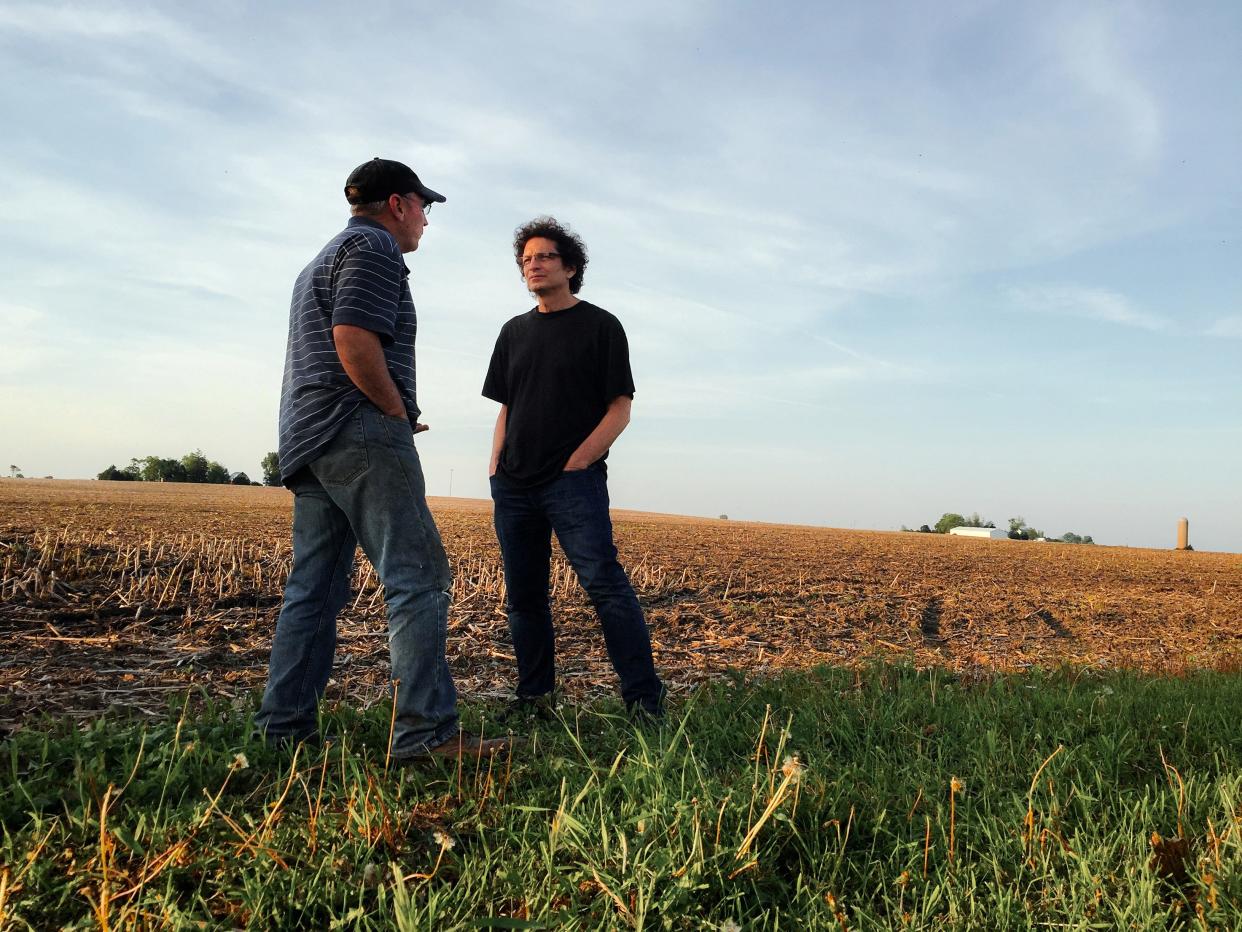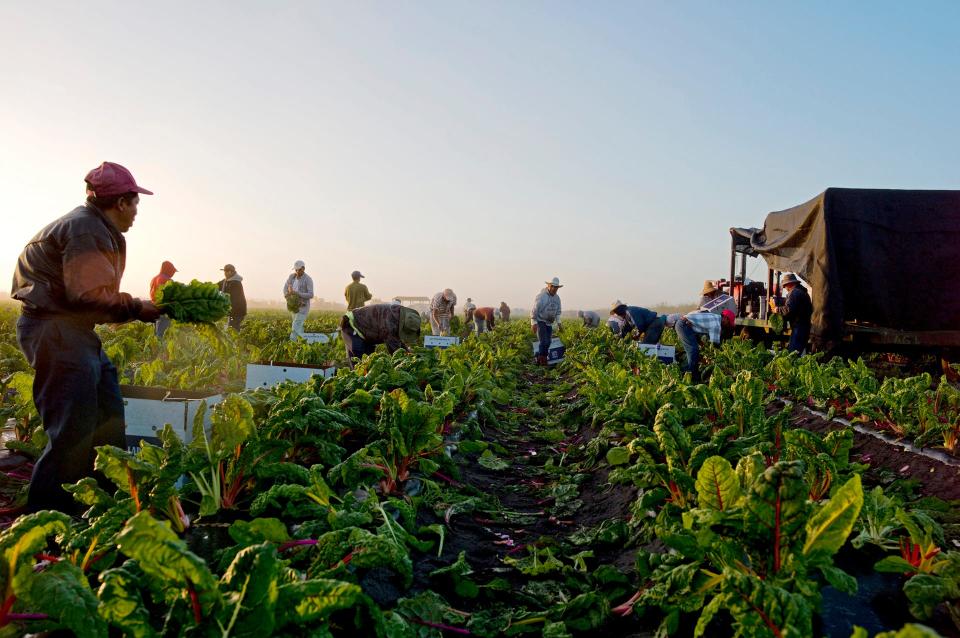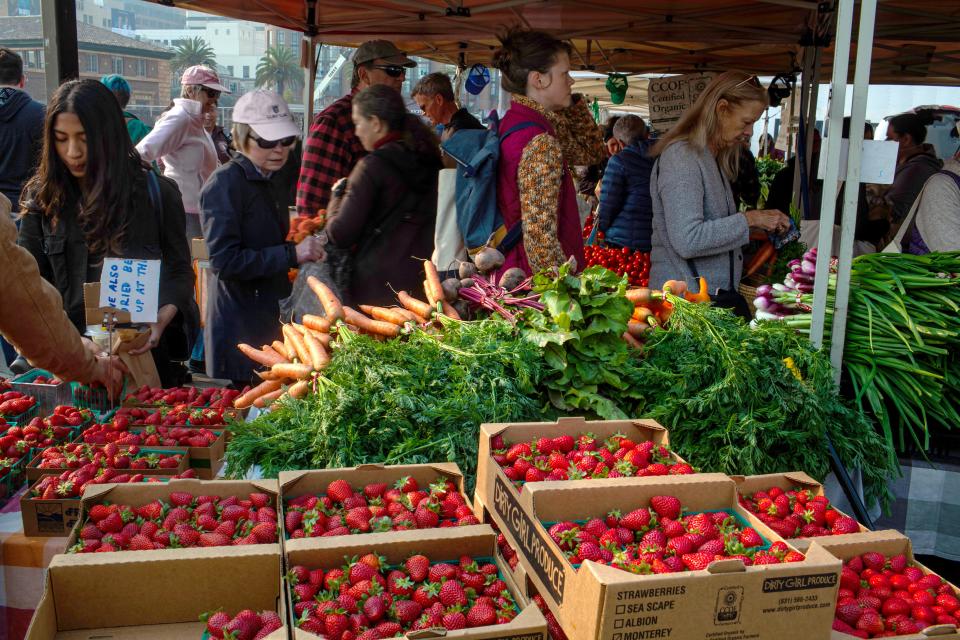'What is in the food': Peoria native creates documentary that explores farming methods

- Oops!Something went wrong.Please try again later.
PEORIA – Anthony Suau's documentary "Organic Rising" sprang from personal experience - after returning to the U.S. from living abroad for many years, American food made him sick.
“I came back to the United States in about 2007. I had a daughter, and I wanted her to have her English – she was born in France. But, also, the work was dwindling in Russia and Europe, and I wanted to get back to the states,” said Suau, a Pulitzer Prize-winning photographer and a Peoria native. “So, initially, I started eating all the foods I had eaten when I was growing up in Peoria, when there was no such thing as organic or GMOs, it was all just sort of organic foods. And I started putting on weight, and I started getting sick like every other week, and I didn’t understand what was going on. Then I started seeing things like 'Food Inc.' and other documentaries and reading some books, and I started realizing that there was a problem with the food system here.”
The experience prompted Suau to embark on a 10-year project, a documentary film on the two major growing systems used in the U.S. — conventional farming, which relies on chemicals and genetically modified seed; and organic farming, which uses crop and soil management strategies with a bare minimum of chemical intervention.
"Organic Rising," a two-hour and 9-minute film, was released earlier this month. It’s currently available online at www.organicrisingfilm.com.
From Peoria to Europe and beyond: A long, interesting career
Anthony Suau was about 10 years old when his father bought him a darkroom kit and introduced him to photography. Soon after, Suau used money he'd earned delivering the Journal Star to buy his first 35mm camera.
While attending Richwoods High School he honed his skills shooting for the school newspaper and yearbook, and after graduating in 1975, he enrolled in the Rochester Institute of Technology in New York. Suau’s first job was with the Chicago Sun-Times. He was a staff photographer at the Denver Post when he won a Pulitzer in 1984 for photos of the famine in Ethiopia.
More: WTVP is at the center of a financial crisis. Here's what we know so far
After going to work for the photo agency Black Star, Suau pursued stories all over the world. In the early 1990s, he became a contract photographer for Time Magazine and moved to Paris.
"The Berlin wall fell, and I was really in the middle of it. I started to work in eastern Europe and then I went to Russia,” said Suau. "I think I spent 10 years photographing in Russia. ... Everything was sort of possible at that time. It was a moment in history when as an American you could really enjoy what Russia has to offer."
After his return to the U.S., Suau was covering the mortgage crisis for Time when he met an organic farmer in California.
"That farmer was in Santa Cruz, and they ended up introducing me to other farmers in the Santa Cruz area. They invited me in and gave me a lot of access to their farms,” said Suau. “The further I got into the topic, the bigger it became, and I understood that the problem was very, very serious."
In 2014 Suau launched a successful Indiegogo crowdfunding campaign to fund his documentary film.
"There were a lot of people interested in that topic, and the people I started to connect with in the industry were very important people, and they started to put large sums of money into the film,” said Suau.

Learning about the chemistry
With the goal of demystifying organic agriculture, "Organic Rising" presents the two main forms of agriculture used in the U.S. and shows how truly different they are.
The documentary delves into how agricultural practices impact both human health and the environment, and also explains the USDA organic regulatory process. Ultimately, the film aims to help consumers make informed choices to support a robust agricultural future.
“The differences between the two are really vast in terms of what is in the food that you’re going to intake. One is very toxic and full of chemicals, and, for the most part, destroys the soil," said Suau. “On the organic side, the whole process is to build the soil — fundamentally, that’s number one and the crops are incidental.”
More: 'This building deserves it': Historic Chillicothe library transformed into new hotel
The film explains how conventional agriculture is dependent on an ever-evolving series of chemicals. Glyphosate, the weed killer in Roundup, no longer works like it once did, and farmers are switching to other chemicals to keep their fields weed-free. Genetically modified seeds are an important part of the system because they produce plants that can withstand being sprayed with powerful weed killers.
Suau was stunned to learn just how toxic some of these agricultural chemicals are when he started working on the film 10 years ago. At first, he didn't believe what he was hearing.
"The stories I recorded and the interviews were so shocking, sometimes I had to turn off the camera because I was literally in tears – it was so intense,” said Suau. “Initially I thought these guys are crazy – there's no way this is happening in our society without being recorded. I was coming from Time Magazine, from mainstream media – they can’t have let a story like this to go unrecorded – it's impossible.”
As he got further into researching the topic, Suau realized what he was hearing is true.
"These guys were not nuts, these guys were geniuses. They really knew what they were talking about. And little by little you had things happen, like the World Health Organization declared that glyphosate is a probable human carcinogen, and all these problems with Monsanto, and court cases that were coming up, that it was causing non-Hodgkins lymphoma – a lot of the things they were saying was starting to come up in mainstream media. But a lot of things in the film are still not as well-known.”

Feeding the world with a system built on life
The film also dispels the myth that organic production methods will not be able to feed the world.
“The Rodale Institute in Pennsylvania had this 30-year trial where they compared the yields between conventional and organic, and they found there was no difference in yields between the two except in times of drought and flood, where the organic farms out produced the conventional because organic soils are so full of microbiology that they retain water,” said Suau.
Organic also has the potential of being more profitable for farmers once you get past the three years it takes to convert a conventional farm to organic, said Suau.
“There’s a difference in terms of the costs involved because the organic farmer has to hand weed his field. There’s that cost. But the seeds were cheaper than the GMOs, and of course they don’t have to pay for all those chemicals,” said Suau. “The big difference was, at the time of the study, the conventional farmer was making $3.50 a bushel, and the organic farmer was making $14 a bushel because there was more of a demand for organic and a smaller supply. Of course, things have shifted over the last year with the Ukrainian war, and the prices for the conventional are up around $7 a bushel, while the organic is around $13 to $14 a bushel, so the organic is still about double.”
More: Stress relief and nature: Healing arts business moves from New Mexico to East Peoria
Organic farming could also be a piece in the puzzle in addressing climate change because organic soils reportedly pull more carbon from the air.
“There’s one study that says if all of the farms in the U.S. went organic and regenerated their soils, that would save about 8% on carbon emissions. On a global level it’s like 25%," said Suau. “It’s a big chunk, but I have to say there are people out there claiming that it’s the solution to climate change, and it’s not.”
Over the last 10 years, Suau has spoken to many scientists and farmers whose words helped him understand the importance of going organic. But as a photographer with a long career of creating evocative images, Suau relates his decision to eat organic in terms of what he has seen.
“It’s an amazing thing to see when they spray the field with glyphosate and within hours or a day every single plant other than the GMO plant is dying,” he said. “It’s really weird, seeing all this death in the field in Illinois, and then going to upstate New York to a big, rich organic farm where they are really building the soil, and seeing all this life and butterflies and all these insects – I mean, just beautiful. And I’m thinking, where do I want to get my food from? It’s so obvious – one system is built on life, and one system is built on death.”
Leslie Renken can be reached at (309) 370-5087 or lrenken@pjstar.com. Follow her on Facebook.com/leslie.renken.
This article originally appeared on Journal Star: Peoria native creates documentary Organic Rising on organic farming

